Rep. Garbarino, NAM Talk CIRCIA Flaws
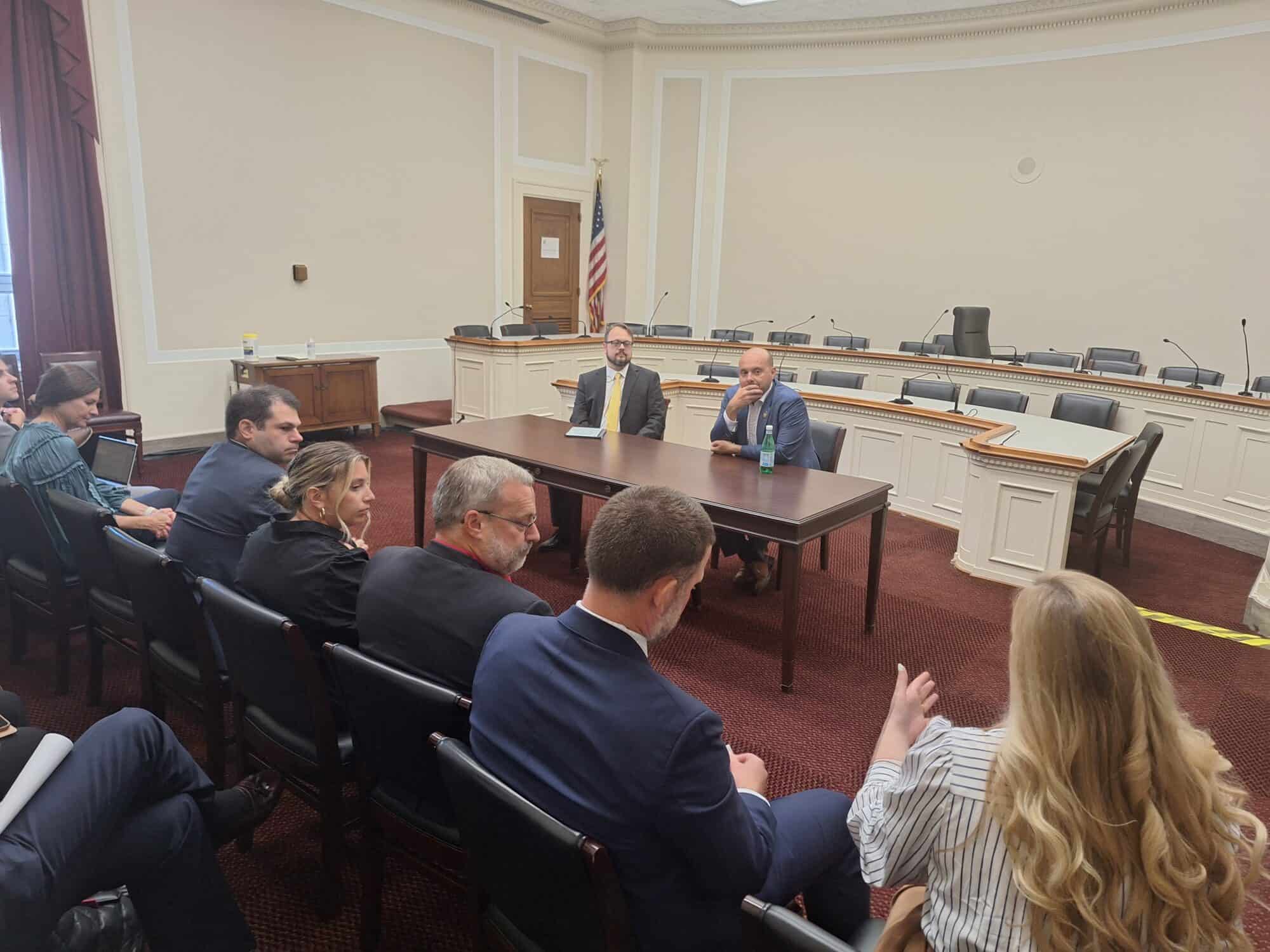
A draft Department of Homeland Security rule requiring that certain sectors expedite cyber-incident reporting has several shortcomings that must be addressed before the rule becomes final in the fall of 2025, the NAM told Rep. Andrew Garbarino (R-NY) in a meeting this week.
What’s going on: Rep. Garbarino, chair of the House Homeland Security Subcommittee on Cybersecurity and Infrastructure Protection, met with manufacturers and the NAM Technology Policy Committee Tuesday to talk cybersecurity issues.
- Much of the discussion focused on draft rulemaking published in April by the DHS’s Cybersecurity and Infrastructure Security Agency. It would require “covered entities” in “critical infrastructure sector[s]” to report any major cybersecurity incidents to CISA within 72 hours.
- Under the Cybersecurity Incident Reporting for Critical Infrastructure Act, CISA must finalize the rule by October 2025.
Why it’s a problem: The NAM agrees with the concerns Rep. Garbarino raised with CISA, including:
- The burden associated with imposing onerous reporting mandates on companies recovering from cyberattacks;
- An overbroad scope, which forces into compliance both organizations that are not truly “critical infrastructure” and those that are too small to have the resources needed to complete the required actions;
- An overbroad definition of incidents requiring reporting;
- An excessive amount of required information;
- An unreasonably high cost of compliance and the diversion of resources away from cyber-incident response; and
- The risk that the proposed rule will jeopardize CISA’s role as a trusted partner of industry.
NAM in action: The NAM submitted comments in response to CISA’s proposal earlier this year outlining these concerns, as well as calling for a reduction in both the number of entities required to file incident notifications and the number of incidents they have to report.
The NAM says: “CISA needs to significantly rethink its approach to CIRCIA’s implementation,” said NAM Senior Director of Technology Policy Franck Journoud.
- “The proposed rule requires far too much information about far too many incidents from far too many companies. CISA should not mandate that companies under attack from hackers divert precious security resources to generate mountains of incident data that CISA will not have the means to process or act upon.”
Take precautions: If you are looking to strengthen your company’s cyber protections, check out NAM Cyber Cover, an affordable, broad security program for NAM members that provides proactive monitoring with automated alerts at no extra cost.
Rep. Chavez-DeRemer Urges Pro-Growth Tax Policy at Miles Fiberglass
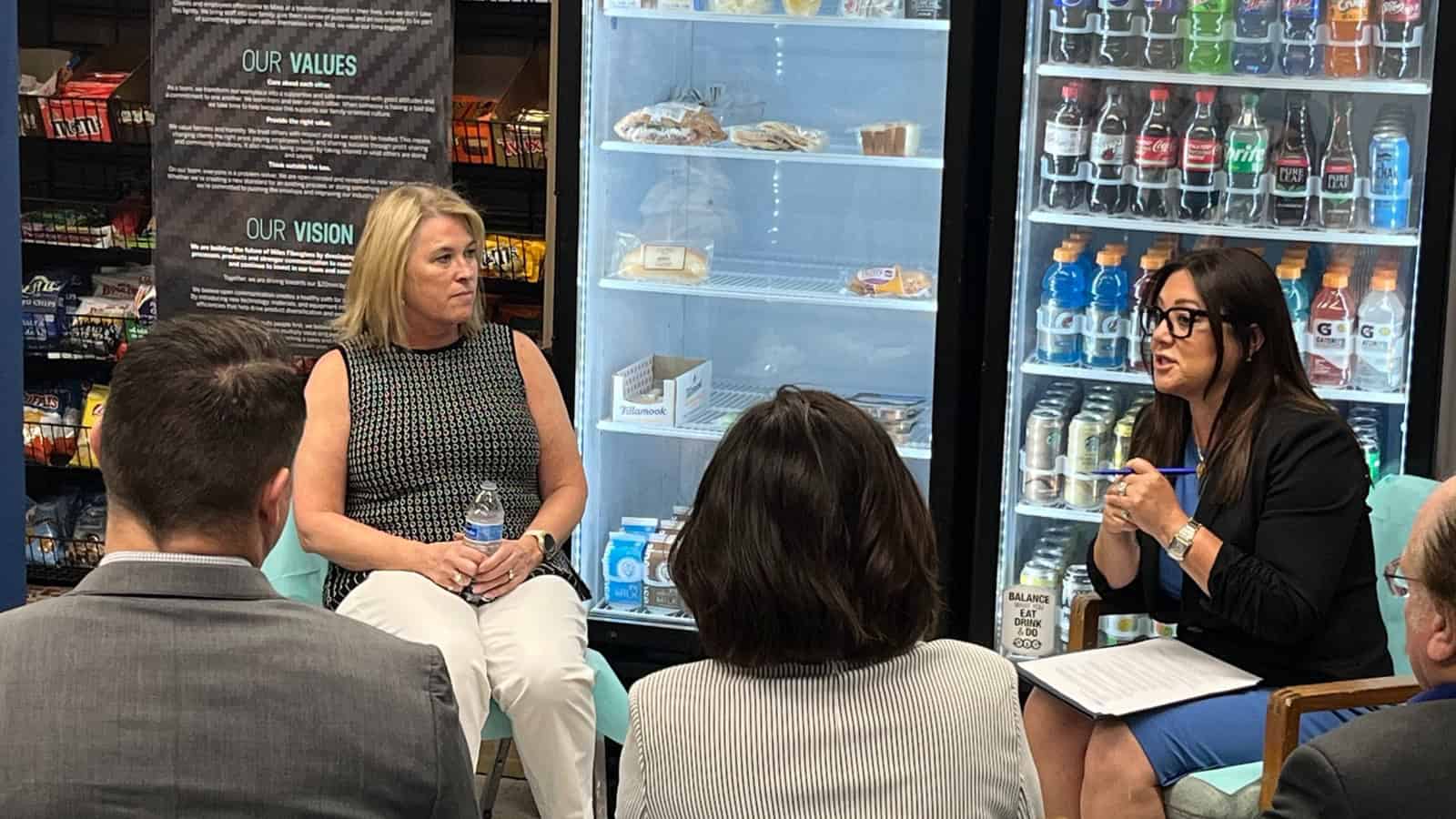
Congresswoman Lori Chavez-DeRemer (R-OR) visited Miles Fiberglass & Composites in Clackamas, Oregon, for a roundtable discussion with local manufacturers and other business leaders on the critical need to protect manufacturing-friendly tax policies. Moderated by Miles Fiberglass President and owner and NAM board member Lori Miles-Olund and attended by representatives of the NAM and Oregon Business & Industry, the discussion centered on the importance of preserving the 2017 Tax Cuts and Jobs Act, which has been a lifeline for small manufacturers.
Stimulating growth: “The 2017 Tax Cuts and Jobs Act freed up capital for us to hire more people, invest in new equipment and increase wages,” said Miles-Olund. “It’s essential for manufacturers like us to have a pro-growth tax code that allows us to stay competitive and innovate.”
- The 2017 reforms lowered the corporate tax rate and provided a 20% pass-through deduction for small businesses, boosting their growth for the past seven years.
- However, with key provisions set to expire in 2025, many manufacturers are concerned about the harm to their businesses if Congress fails to act.
A looming threat: Rep. Chavez-DeRemer addressed the impending expiration of these tax provisions, saying, “We cannot afford to return to a tax system that punishes manufacturers for investing in the U.S.”
- She also highlighted the economic ripple effects of tax hikes, noting that when manufacturers are forced to scale back investments, it affects not just their operations but also their suppliers and communities.
- OBI President and CEO Angela Wilhelms echoed these concerns. “Preserving these tax reforms is essential to ensuring that Oregon businesses remain competitive on a global stage,” she said.
Empowering women: Rep. Chavez-DeRemer also discussed the importance of empowering women in the manufacturing sector. She praised Miles Fiberglass’ efforts to recruit more women, adding that legislation like the National Apprenticeship Act can help open doors for women and close the skills gap in manufacturing.
The last word: “We need policies that allow manufacturers to thrive,” Rep. Chavez-DeRemer said. “Congress must prioritize protecting jobs, ensuring economic stability and keeping American manufacturing competitive.”
If you want to add your voice to the fight for tax reform, or host legislators for a facility visit, check out the NAM’s “Manufacturing Wins” campaign.
Small Manufacturers Speak Out Against the Estate Tax

Passing on the family business can also mean passing on a big tax bill, and family-owned manufacturers are speaking out to keep those bills from getting any bigger.
What’s happening: As part of its “Manufacturing Wins” campaign to preserve 2017 tax reform, the NAM is calling on Congress to secure the law’s changes to the estate tax.
- Tax reform increased the estate tax exemption threshold, which protects some of a family-owned business’s assets from the tax.
- The threshold is set to be slashed in half at the end of 2025, subjecting more of family-owned manufacturers’ assets to taxation and making it harder for them to pass their business on to the next generation.
Protecting physical assets: Manufacturers constantly invest in physical assets like facilities and machinery to stay competitive, making the estate tax especially damaging.
- “We’re not a liquid company,” said Tom Tredway, president of Erie Molded Packaging in Pennsylvania. “Almost every penny we earn is poured back into our business so we can grow and compete. The increased estate tax exemption threshold is set to expire at the end of 2025, which will threaten my ability to pass the business on to my children.”
- “The estate tax doesn’t just hurt family businesses—it hurts the workers,” added Scott Livingston, president and CEO of HORST Engineering in East Hartford, Connecticut. “It also hurts our customers and the communities that we serve.”
Preserving company values: For Click Bond, a family-owned adhesives manufacturer in Carson City, Nevada, paying a higher estate tax bill could mean compromising the business’s vision and values.
- “We may have become a family business by happenstance, but we remain one by strategy,” said CEO Karl Hutter. “With reduced lifetime estate tax exemptions, family businesses will face the threat of having to liquidate, divest or take in outside capital that may not align with their strategy or values simply to create liquidity to pay a tax bill.”
- “The estate tax rips financial resources from productive organizations,” said Dave True of the 76-year-old True Companies in Casper, Wyoming. “These financial resources are critical to small companies and the families they support.”
Saving livelihoods: For some families, the estate tax threatens to turn a death in the family into the death of the business.
- “When I lost my husband to brain cancer, not only did I have to worry about keeping the business afloat, but I also had to worry about a looming tax bill that might have forced us to halt production altogether,” said Courtney Silver, president and owner of Ketchie, Inc. in Concord, North Carolina.
- Silver, who chairs the NAM’s Small and Medium Manufacturers Group, continued: “If not for the federal estate tax exemption being increased in 2017, Ketchie might not be here today.”
The last word: Lori Miles-Olund, the third-generation owner and president of Miles Fiberglass & Composites, Inc. in Clackamas, Oregon, put it simply: “Congress must preserve the increased estate tax exemption to protect family-owned businesses like ours from potential insolvency when the owner passes away.”
Curb Proxy Firms, NAM Tells Congress
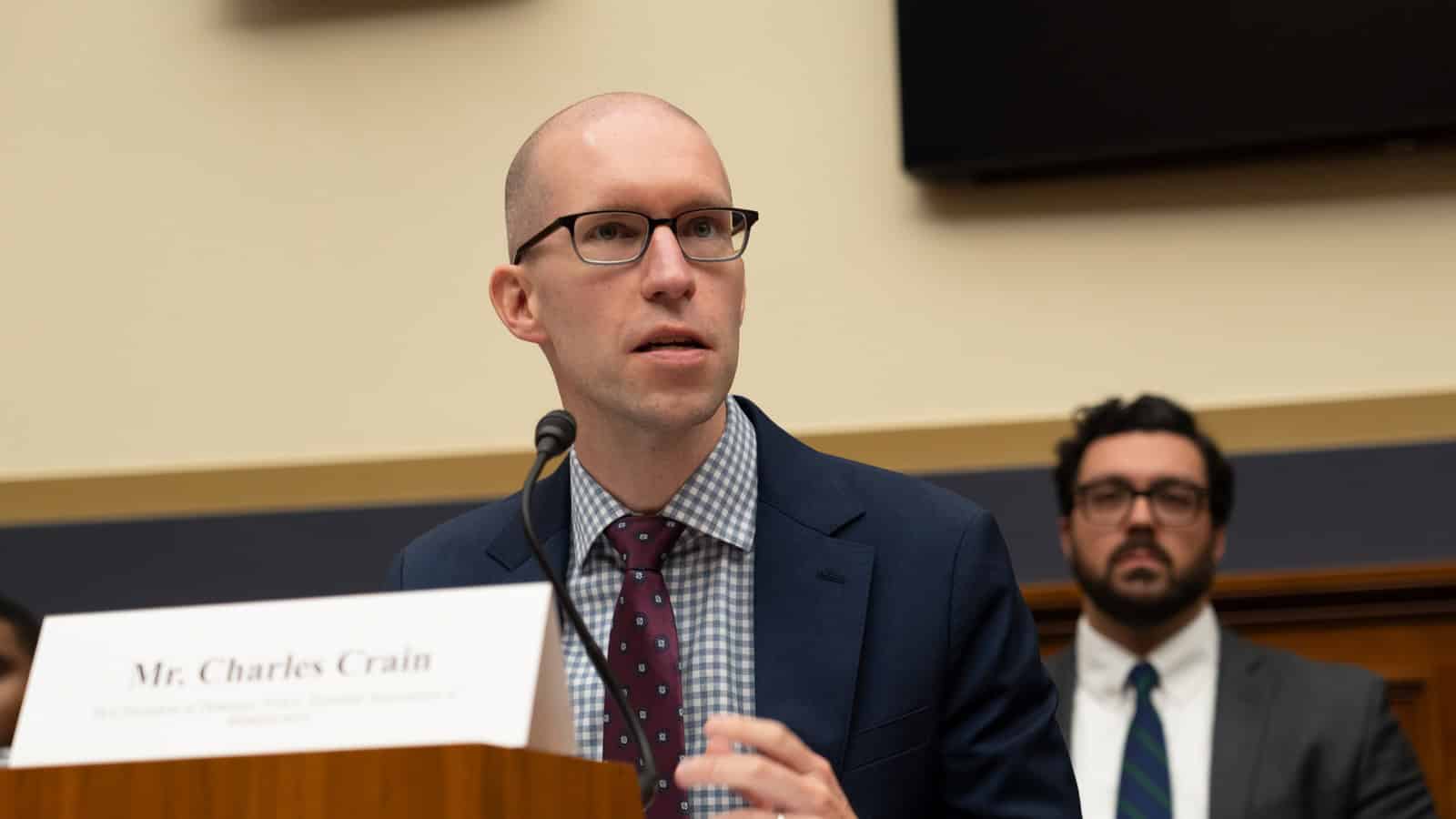
Less than three months after scoring a significant win for manufacturers against Securities and Exchange Commission overreach, the NAM was back in front of Congress to urge regulatory oversight of proxy advisory firms.
What’s going on: On Tuesday, the NAM testified before the House Financial Services Oversight and Investigations Subcommittee on the need to bring oversight and accountability to proxy advisory firms. These are entities that make recommendations regarding the way shareholders should vote on proxy ballot proposals brought before publicly traded companies.
- “Proxy firms are powerful, unaccountable actors that pose a real threat to Americans’ financial security. Manufacturers have been subject to these firms’ outsized influence for far too long,” NAM Vice President of Domestic Policy Charles Crain said during Tuesday’s hearing.
The background: In 2020, the SEC finalized an NAM-supported rule instituting important proxy reforms, such as requiring proxy firms to disclose any conflicts of interest. The NAM has fought in court to preserve the 2020 rule, successfully defeating the SEC’s attempts to suspend the rule and to rescind its most crucial provisions. The NAM is now back in court in a third case, defending the SEC’s authority to regulate these powerful market actors.
Surrendering to ISS: Institutional Shareholder Services Inc., the largest and most influential proxy advisory firm, is now “suing the SEC over its authority to issue the 2020 rule—not just the rule’s particulars, but the SEC’s ability to regulate proxy firms at all,” Crain continued.
- Troublingly, “the SEC is waving the white flag in the face of [the] challenge,” he told lawmakers, referring to the agency’s decision not to appeal after a district court sided with ISS earlier this year.
“Sole defender”: The NAM—now the “sole defender of the 2020 rule”—is appealing the district court’s decision.
What Congress should do: Legislators must take up the mantle, too, Crain concluded.
- “Congress should do what the SEC will not: affirm the SEC’s clear authority, provide much-needed oversight and accountability and help manufacturers and Main Street investors escape the outsized influence of proxy advisory firms.”
The NAM Briefs Congress on AI
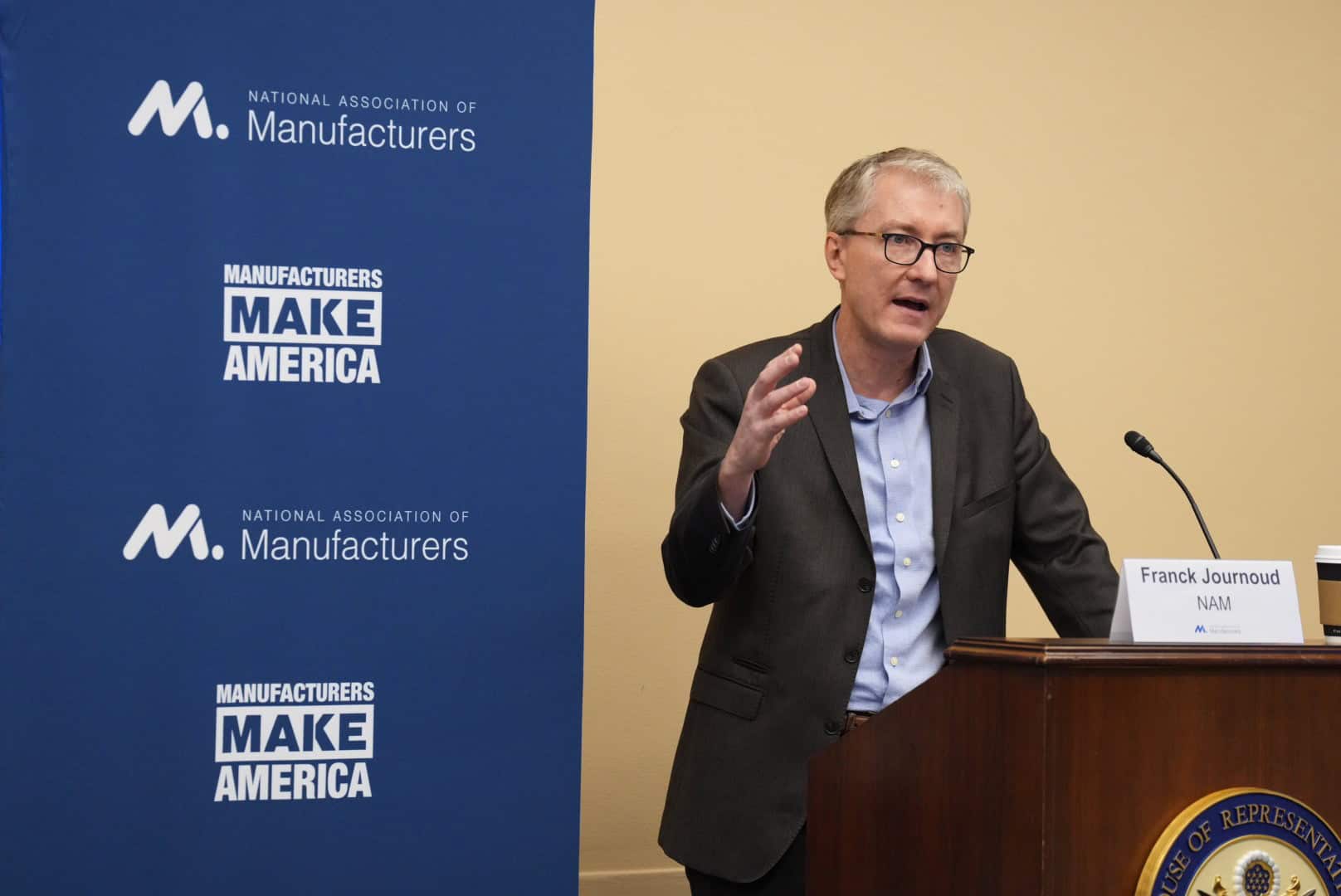
Generative AI tools like ChatGPT and Midjourney have grabbed headlines, but artificial intelligence–driven innovations like digital twins, computer vision and robotics are also transforming manufacturing in America.
Last week, the NAM briefed congressional staff from the House Task Force on AI to help educate policymakers on the role manufacturers are playing as both developers and deployers of AI technologies. The briefing follows the publication of the NAM’s first-of-its-kind white paper on the ways manufacturers are using AI.
The briefing featured a panel discussion among AI experts from major manufacturers, as well as the AI leads from the NAM and the Manufacturing Leadership Council.
Faster breakthroughs: AI is accelerating research and development at manufacturing companies, the panelists reported, allowing them to create or improve products in record time.
- For example, pharmaceutical companies are using AI to develop and test new lifesaving drugs, while automakers are using it to improve vehicle components.
Increased safety: AI is helping to prevent accidental collisions on the shop floor and enhancing equipment that makes tasks safer, such as robotic exoskeletons that collect and learn from data on the wearers’ movements and environment.
- In addition, companies are using AI to better understand and monitor product performance, helping reduce maintenance costs and avoid dangerous malfunctions.
Augmenting human labor: Manufacturers often use AI technology to complement and augment the work of humans, according to the panelists.
- Human operators still make decisions and oversee operations, but AI has helped improve the reliability of manufacturers’ processes as well as the quality, delivery and safety of their products.
- This combination of human ingenuity and AI enhances efficiency while still prioritizing human experience.
Policy recommendations: Panelists discussed what Congress can do to support AI-driven growth in the manufacturing sector, including:
- Modernizing compliance requirements to support AI development and adoption, especially for small manufacturers most affected by regulations;
- Ensuring that the regulatory environment helps the U.S. maintain global leadership in AI innovation, including by adjusting rules based on context and risk; and
- Creating or supporting initiatives to train workers in AI-related skills, including by providing the data needed to develop these programs.
The last word: “The future of manufacturing is inseparable from the future of AI,” said NAM Senior Director of Technology Policy Franck Journoud.
- “It is crucial that policymakers hear directly from manufacturers that are leading the development and adoption of this transformative technology. The NAM is thankful to have had an opportunity to share this world-class expertise, and we are committed to working with Congress to ensure the U.S. remains a global leader in AI innovation.”
The Estate Tax, Explained

Congress should preserve tax reform’s changes to the estate tax, protecting family-owned manufacturers from tax increases scheduled for the end of 2025, according to a new explainer published by the NAM as part of its “Manufacturing Wins” tax campaign.
The background: In 2017, tax reform doubled the value of assets that could be exempt from the estate tax, a levy imposed on family businesses upon the death of their owners, when proprietorship passes to the next generation.
What’s going on: This valuation threshold is scheduled to be cut in half at the end of 2025, subjecting more assets of family-owned manufacturers to taxation and increasing these companies’ tax liability.
Why it’s important: A bigger tax burden would threaten the continued existence of family-owned companies and make it more difficult to pass family businesses on to the next generation.
- These firms could be forced to liquidate operation-critical assets, such as facilities and equipment, in order to pay the estate tax.
- An increased estate tax bill could mean that family-owned manufacturers are forced to take on debt, limit operations, reduce employee headcount or close entirely following the death of a loved one.
What else is at risk: Some legislators have floated the idea of repealing or limiting stepped-up basis, which stops a business owner’s heirs from being forced to pay capital gains taxes on asset appreciation that took place while the owner was alive.
What must be done: “Congress must preserve tax reform’s increased estate tax exemption threshold and maintain stepped-up basis,” said NAM Vice President of Domestic Policy Charles Crain.
- “Protecting family-owned manufacturers from the estate tax will prevent these small businesses from incurring costly and damaging tax bills that threaten their viability following the death of a loved one.”
NAM to EPA: Reissue Formaldehyde Analysis

The Environmental Protection Agency’s final formaldehyde analysis—issued in August and set to inform future regulations—risks “creat[ing] an unachievable standard and a de facto ban” on an essential manufacturing material, the NAM said.
What’s going on: On Aug. 20, the EPA’s research office issued its conclusions about the “amount of the chemical that could be harmful” to humans, saying that “[s]mall amounts … can increase people’s risk of [health] problems” (Bloomberg Law, subscription).
- Though the report itself does not mandate any new restrictions on the industry, the EPA is likely to use the findings to take the next step in the regulatory process—a final risk evaluation—by the end of 2024 (The Hill).
- The assessment maintains the formaldehyde threshold of 11 parts per billion proposed by the agency in 2022. That’s 30 times lower than Europe’s recently updated worker-exposure limit of 300 parts per billion and “lower than what can be found in homes or even background levels for outdoor air,” the NAM told the EPA.
Why it’s a problem: Formaldehyde is used widely across industries to produce numerous everyday items, including plastics, lubricants, automotive parts, fertilizers, adhesives and more.
- The final analysis, which was released without review by the EPA’s own Science Advisory Committee on Chemicals, fails to account for “the highly developed safety procedures, protocols and [personal protective equipment] used throughout [the manufacturing] industry.”
- A severe restriction on the allowable workplace threshold of formaldehyde “could wreak havoc on domestic supply chains,” according to the NAM.
What should be done: The EPA should reissue its risk evaluation to give the SACC an opportunity to review it and provide comments—“and allow for additional public comment after the SACC review is complete,” the NAM concluded.
An Iowa Manufacturer Urges Congress to Preserve Tax Reforms
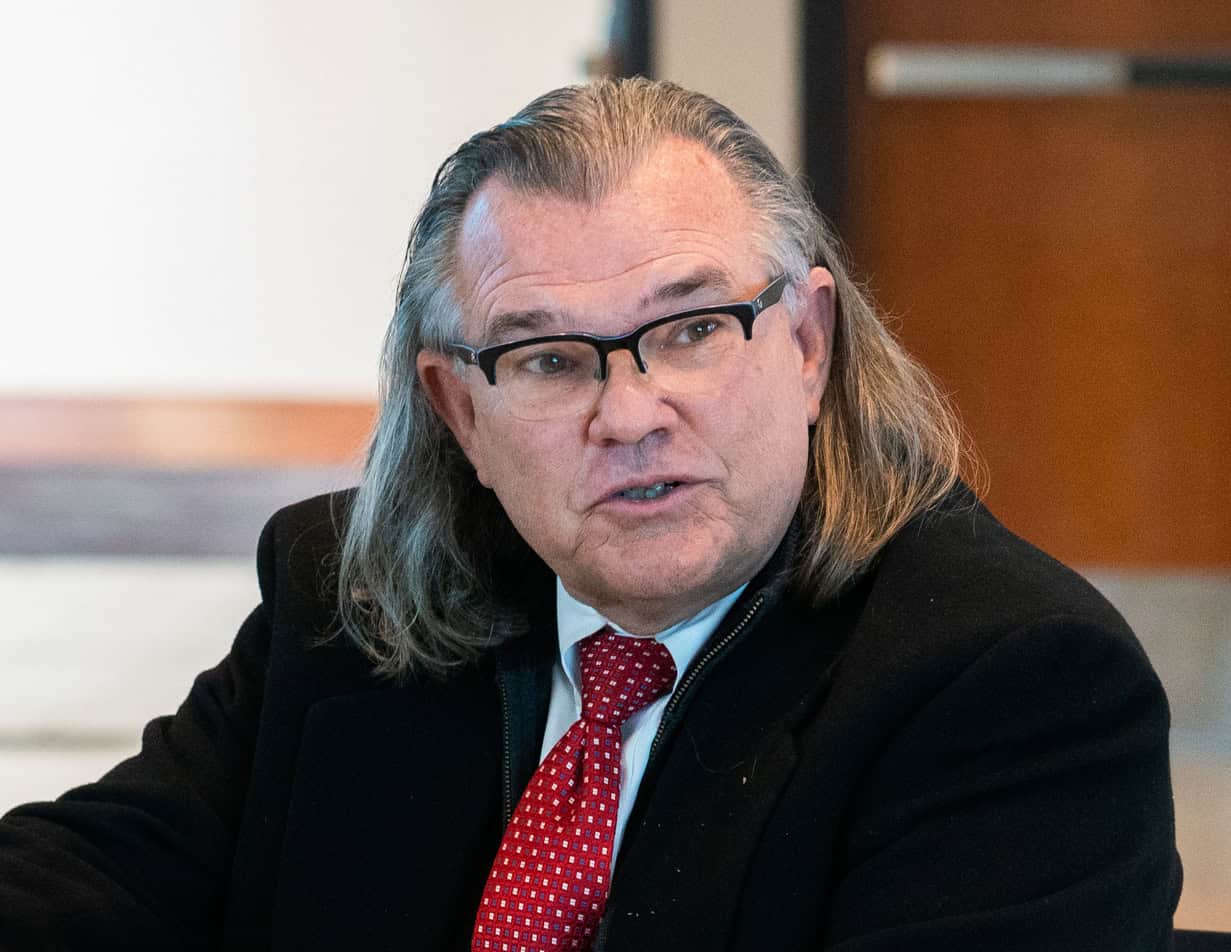
Manufacturers are counting on Congress to preserve tax reforms that acted as “a shot in the arm” but are now at risk of expiring, Sukup Manufacturing Co. President and CEO Steve Sukup told the House Ways and Means Committee recently.
What’s going on: The committee held a field hearing at the Iowa State Fair in Des Moines last month to hear from local companies about the impact of the 2017 Tax Cuts and Jobs Act on their businesses.
- At Sukup—the world’s largest family-owned and -operated maker of grain storage, drying and handling equipment—tax reform is credited as the single biggest driver of growth in recent years.
- “Sukup has grown over the past several decades, but nothing compares to when the Tax Cuts and Jobs Act was signed into law,” Sukup told committee members. “For example, thanks to the lowering of the corporate rate to 21%, Sukup grew our workforce by a third, adding roughly 200 well-paying manufacturing jobs to our community.”
A business boon: The 61-year-old company was able to make several key investments thanks to tax reform.
- Among these is Sukup’s Safe T Homes, quick-assembly houses made from the company’s grain bins and created after the 2010 earthquake in Haiti to provide people with much-needed shelter. One of the homes was on display at the fairgrounds.
- Another undertaking made possible by tax reform was the world’s largest free-span grain bin, two corn storage containers made for an ethanol plant in Mason City, Iowa. Each bin has a record-breaking capacity of 2.2 million bushels.
- Tax reform’s accelerated depreciation schedule allowed the business to go “from roughly $5 million in capital spending to almost $15 million,” Sukup told committee members.
What’s in jeopardy: The expiration of key tax provisions in 2022 and 2023—with more tax increases scheduled for the end of next year—has made it far more difficult for Sukup to put money back into the business.
- For example, tax reform’s pro-growth interest deductibility standard expired in 2022, making debt financing more expensive. “An accountant once told me, if you don’t have debt, that means you’re not coming up with new ideas,” Sukup said. “Many manufacturers like us borrow funds to finance essential long-term investments,” which are now more costly.
- Sukup is also monitoring looming changes to the estate tax. He called on Congress to protect family-owned manufacturers from the estate tax “so that I can ensure the third and fourth generations of Sukups can continue in our family business.”
Keep it going: Sukup ended his testimony by reiterating the advantages tax reform brought to his business and emphasizing the need for Congress to preserve tax reform in full.
- “Because of these policies, we’ve been able to not only maintain our business, but to provide a great living, health benefits and soon expanded child care for our employees and the community—even as we aid those in need around the globe,” he concluded.
- “I urge you to help us keep that growth streak going. Maintaining the 21% corporate rate, as well as the tax provisions I just described, is so important to manufacturers everywhere.”
NAM Launches Ad Campaign for PBM Reform

The NAM has launched a new wave of ads in D.C. and nine states, extending its seven-figure campaign urging policymakers to reign in pharmacy benefit managers, underregulated middlemen who drive up the costs of prescription medications for manufacturers and manufacturing workers.
A quick refresher: PBMs sit in the middle of the health care industry, negotiating with employer health plans, insurers, biopharmaceutical manufacturers, pharmacies and other players to determine what prescriptions employees can access and what they pay for them. While their job is ostensibly to reduce the costs of medicines, often they do the exact opposite.
- PBMs have been found to steer patients toward pricier options, inflict steep mark-ups and hidden fees and even pocket large portions of the rebates that biopharmaceutical manufacturers intend for American workers and their families.
NAM in action: The NAM has been a staunch voice supporting PBM reform on Capitol Hill, recently laying out manufacturers’ concerns for the House Committee on Oversight and Accountability.
- The committee conducted its third hearing on PBM overreach in July, when it also released a highly critical report on PBMs that echoed many of the NAM’s concerns.
- In addition, the NAM is supporting several key measures to increase oversight of PBMs’ business models and reform their pricing strategies, including the DRUG Act and the PBM transparency provisions in the Lower Costs, More Transparency Act.
What Congress should do: The NAM is advocating for three major reforms to the PBM system, including:
- Increasing transparency in PBMs’ business models, including how their compensation influences health care decisions and how their policies dictate a medicine’s cost and formulary placement;
- Rebate pass-through, which will ensure health care savings are passed directly to manufacturers and their workers rather than being pocketed by PBMs; and
- Delinking PBMs’ compensation from a medicine’s list price, removing their incentive to put upward pressure on list prices to maximize their own profits.
Benefits for all: The NAM is calling on Congress to enact these reforms in the commercial insurance market, not just in government programs like Medicare and Medicaid, so that all Americans can enjoy lower-cost health care benefits.
What to watch: The NAM is calling on Congress to act on this issue during the lame-duck session following the election.
Rep. Buddy Carter Calls for PBM Reform, Tax Action at RYAM
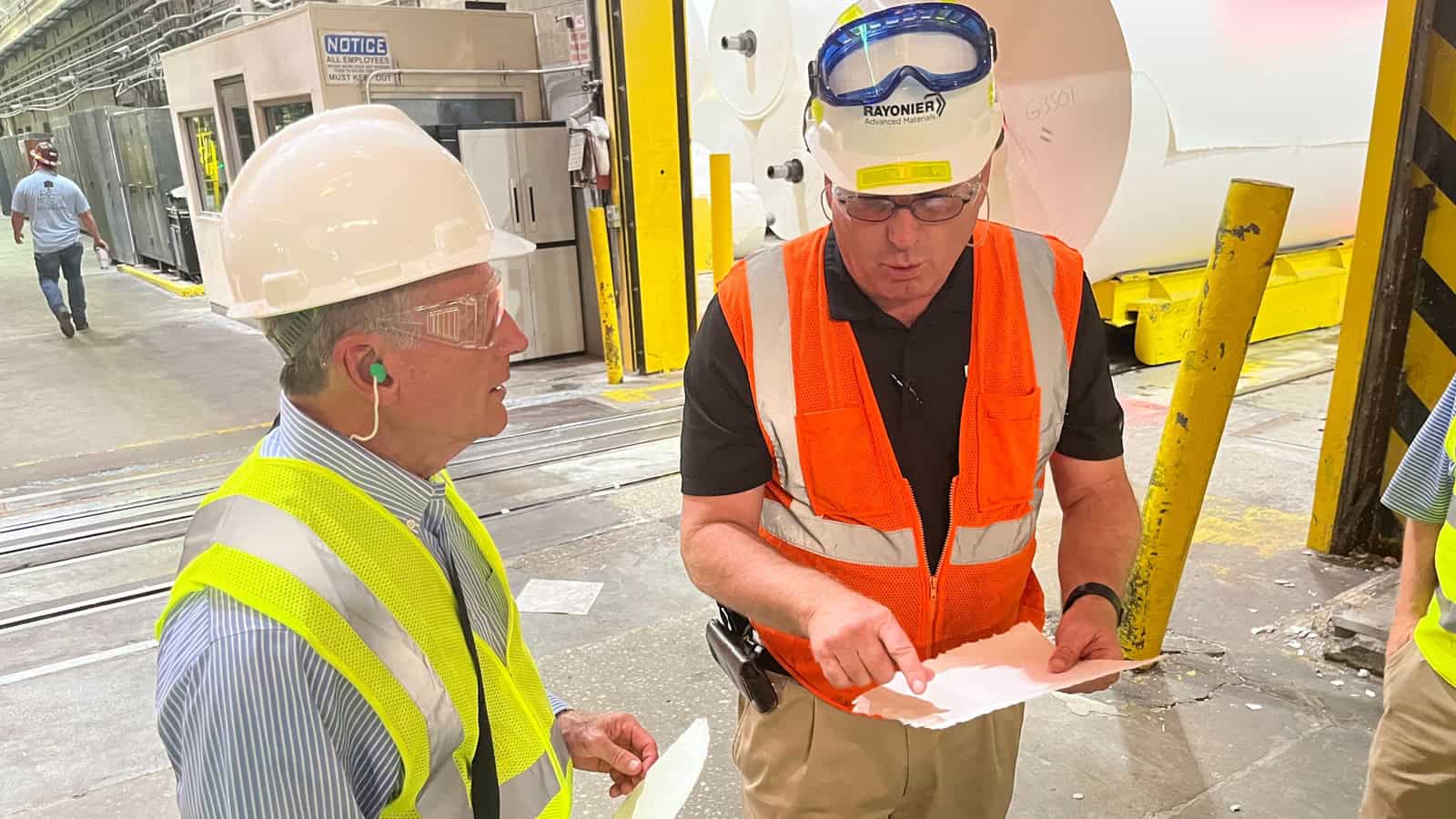
Rep. Earl L. “Buddy” Carter (R-GA), a staunch advocate for health care reform and a community pharmacist by profession, visited RYAM’s manufacturing facility in Jesup, Georgia, in August to discuss manufacturers’ health care and tax policy priorities.
During the visit, Rep. Carter emphasized the critical need for pharmacy benefit manager reform as well as tax policies that support manufacturers’ growth and competitiveness.
The visit: Clay Bethea, RYAM’s Jesup plant general manager and vice president of U.S. wood procurement, led Rep. Carter on a tour of the cellulose specialties manufacturer’s facility, where he observed how pulp is dried and finished into sheets and rolls. Bethea highlighted the significant challenges the company faces due to rising costs in health care, particularly those driven by PBMs, and the looming expiration of key tax provisions in 2025.
- “We are proud to be a part of this community, creating jobs and driving economic growth,” Bethea said. “However, the rising costs of health care, particularly due to PBMs, and the uncertainty around critical tax provisions like R&D expensing and accelerated depreciation, are growing concerns for both our business and our employees. Reforming PBMs and maintaining tax policies that allow us to invest for the future are crucial to our ability to remain competitive globally.”
PBM reform: Rep. Carter has long been vocal about the need to hold PBMs accountable for their role in inflating health care costs.
- “PBMs have become powerful middlemen, often driving up drug prices while squeezing independent pharmacies out of the market,” Rep. Carter said during the tour. “It’s time for Congress to bring transparency and fairness back to the system.”
- Carter has introduced and supported several pieces of legislation designed to reform PBM practices, including a bill aimed at delinking PBM compensation from drug prices, improving PBM payments to pharmacies and increasing transparency.
Tax challenges: In addition to health care, Rep. Carter addressed the pressing issue of preserving tax reform.
- “The expiration of accelerated depreciation, R&D expensing and favorable tax rates could significantly hamper the manufacturing industry’s ability to grow and remain competitive globally,” Rep. Carter warned.
- “These tax provisions have been crucial for manufacturers like RYAM, enabling them to make significant investments in their operations and workforce. Losing them would not only impact these companies’ ability to innovate but also jeopardize jobs and economic growth in communities across the country.”
NAM in action: The NAM has long advocated for both PBM reform and the preservation of essential tax policies that drive the manufacturing industry.
- “PBMs are a significant driver of the rising costs of health care, and reform is essential to ensure that manufacturers can provide affordable benefits to their workers,” said NAM Vice President of Domestic Policy Charles Crain.
- “Congress also needs to act with urgency to prevent devastating tax increases scheduled for next year that will impact manufacturers across the country.”
The state-level view: Lloyd Avram, president and CEO of the Georgia Association of Manufacturers, echoed Rep. Carter’s concerns.
- “Manufacturers across Georgia are facing unsustainable health care expenses, and the uncertainty surrounding federal tax provisions only adds to the challenges,” Avram said. “Action on PBM reform and tax policy is essential to helping our industry remain competitive and continue providing good jobs in our communities.”
The bottom line: “Reducing health care costs and increasing transparency in the PBM system are crucial steps in lowering the overall cost of doing business in the U.S.,” said Rep. Carter. “However, to truly compete in the global economy, it’s important that we preserve the policies that have empowered manufacturers to innovate, expand and sustain jobs. Otherwise, the U.S. risks becoming a less attractive place for manufacturing investment, ultimately threatening our economic leadership on the world stage.”
